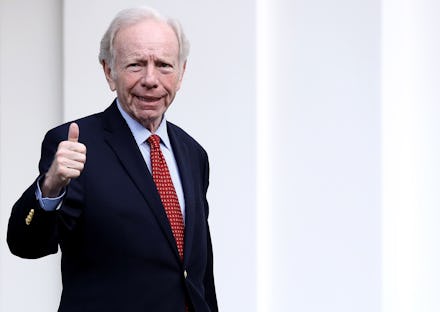5 times Joe Lieberman has burned Democrats

Former Senator Joe Lieberman is reportedly President Donald Trump's top pick for the next FBI director — and Democrats aren't happy about it.
Critics of the former Democratic vice-presidential candidate's potential nomination have pointed to his glaring lack of law enforcement experience and possible conflicts of interest as reasons he's not qualified for the position. But for many Democrats, their strong opinions against Lieberman are rooted in years of feeling betrayed by the longtime Democrat who now identifies as an independent.
Here are five times Lieberman has gone against the Democratic party and its positions.
He endorsed John McCain and spoke out against Barack Obama
Just eight years after running on the Democratic presidential ticket with Al Gore, Lieberman switched to the other side of the aisle for the 2008 election. In addition to endorsing John McCain for president, Lieberman spoke at the 2008 Republican National Convention, where he urged Democrats and Republicans alike to support McCain over then-candidate Barack Obama.
"Senator Barack Obama is a gifted and eloquent young man who I think can do great things for our country in the years ahead, but, my friends, eloquence is no substitute for a record, not in these tough times for America," Lieberman said in the speech, as quoted by the New York Times.
"In the Senate, during the three-and-a-half years that Senator Obama has been a member, he has not reached across party lines to ... accomplish anything significant, nor has he been willing to take on powerful interest groups in the Democratic Party to get something done," Lieberman continued.
Lieberman has long had an alliance with McCain, who openly supported Lieberman's potential FBI director nomination on Thursday. During Lieberman's Senate tenure, the two senators and Sen. Lindsay Graham were known as the "three amigos," forging an alliance to help further their shared foreign policy goals.
He supported the Iraq War and harsh security policies
During George W. Bush's presidency, Lieberman was a vocal supporter of the controversial Iraq War — much to his then-Democratic colleagues' chagrin.
"It's time for Democrats who distrust President Bush to acknowledge that he will be the commander in chief for three more critical years, and that in matters of war, we undermine presidential credibility at our nation's peril," Lieberman said at a 2005 press conference, as quoted by the Washington Post.
The senator's opinions about the war earned him little support among his party. One senior Democratic aide in the Senate told the Post that Lieberman "is past the point of being taken seriously in the caucus because everything he does is seen as advancing his own self-interest, instead of the Democratic interest."
In addition to supporting the war, Lieberman also broke with the traditional Democratic party line to show support for strong tactics against suspected terrorists. Lieberman and McCain introduced a bill in 2010 that would allow the government to indefinitely detain terrorism suspects without due process. In 2008, Lieberman "reluctantly acknowledged" that waterboarding should not be considered torture, explaining the tactic "is not like putting burning coals on people's bodies."
The senator is also a proponent of increased national surveillance, and stated in 2010 that the New York Times should be investigated for violating the Espionage Act by publishing State Department information obtained by WikiLeaks. Lieberman has defended Trump's "Muslim ban" and favored singling out American Muslim communities as the focus of terrorism investigations.
He ran against the Democrats as an independent
Lieberman's Democratic constituents turned against the senator in response to his support for the Iraq War, causing him to lose the primary election for his fourth Senate term in 2006 to fellow Democrat Ned Lamont. The senator's loss was only the fourth time an incumbent senator had lost a primary election since 1980, NPR noted.
Instead of accepting defeat, however, Lieberman simply ran against his former party by becoming an independent candidate — and won. The former Democrat went on to serve in the Senate as an independent until his retirement in 2012.
He openly spoke out against Bill Clinton
As Bill Clinton's presidency became embroiled in the Monica Lewinsky scandal in 1998, Lieberman wasn't one to stand by his party's leader. The senator openly criticized the president's behavior in a speech on the Senate floor, although he did not support Clinton's impeachment.
"[The] transgressions the president has admitted to are too consequential for us to walk away and leave the impression for our children and for our posterity that what President Clinton acknowledges he did within the White House is acceptable behavior for our nation's leader," Lieberman said in the speech. "On the contrary, as I have said at length today, it is wrong and unacceptable and should be followed by some measure of public rebuke and accountability."
He defied many of Obama's proposed policies, including healthcare
Lieberman wasn't afraid to stand up to Obama, either. During his time in the Senate under Obama, Lieberman said he would do "everything I can" to extend the Bush tax cuts, which Obama wished to let expire. Even after his retirement, Lieberman vigorously opposed Obama's nuclear deal in Iran, joining the advisory board of the anti-Iran deal group Citizens for a Nuclear Free Iran.
Most notable, however, is Lieberman's opposition to the Affordable Care Act and several of its initial sanctions, including a public option for government-subsidized healthcare and a Medicare "buy-in" provision that would have lowered the age threshold to 55. If Lieberman had supported these provisions — neither of which made it into the final bill — he would have given Democrats the key 60th Senate vote needed to end a filibuster and move the health care bill forward to a vote.